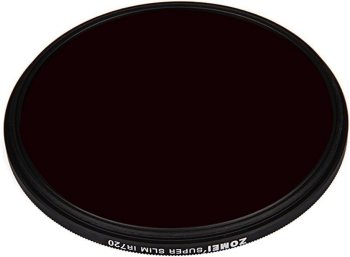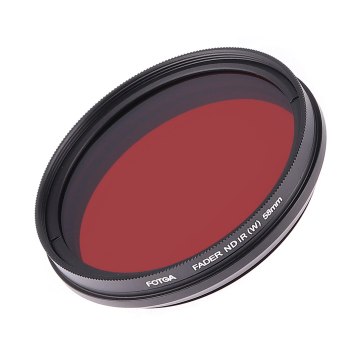- Budget-friendly
- Good performance
- Easy to attach
- Reliable performance
- Affordable price
- Easy to use
- May require post-processing
- Not as durable as premium options
- Limited to 58mm lenses
- May need post-processing
Zomei 720nm IR vs Neewer 58mm Infrared Filter
When it comes to capturing stunning infrared photographs, the right equipment is essential. Two popular options on the market are the Zomei 720nm IR and the Neewer 58mm Infrared Filter. Both of these products fall under the category of infrared lens filters, which are designed to block visible light and allow only infrared radiation to pass through, resulting in unique and captivating images.
Zomei 720nm IR
The Zomei 720nm IR is a high-quality infrared filter that blocks wavelengths below 720 nanometers, allowing only near-infrared radiation to reach the camera's sensor. This results in photographs with a distinct pink or red hue, characteristic of infrared photography. The Zomei filter is made from high-quality glass and features a sturdy aluminum frame, ensuring durability and longevity.
One of the key advantages of the Zomei 720nm IR is its ability to produce consistent and reliable results. The filter's precise cutoff point ensures that unwanted visible light is blocked, resulting in images with excellent contrast and detail. Additionally, the Zomei filter is compatible with a wide range of lenses, making it a versatile option for photographers who use multiple cameras or lenses.
Neewer 58mm Infrared Filter
The Neewer 58mm Infrared Filter is another popular option among infrared enthusiasts. This filter blocks wavelengths below 850 nanometers, allowing only far-infrared radiation to pass through. The resulting images have a more extreme color palette, with a pronounced blue or purple hue.
One of the main advantages of the Neewer filter is its affordability. Compared to the Zomei 720nm IR, the Neewer filter is significantly cheaper, making it an attractive option for photographers on a budget. Additionally, the Neewer filter is designed specifically for 58mm lenses, ensuring a secure and precise fit.
Comparison
When comparing the Zomei 720nm IR and the Neewer 58mm Infrared Filter, several key differences emerge. Firstly, the Zomei filter has a more precise cutoff point (720nm) compared to the Neewer filter (850nm), resulting in slightly different color palettes and contrast levels. The Zomei filter tends to produce images with a warmer tone, while the Neewer filter produces images with a cooler tone.
Another key difference is the build quality and durability of the two filters. The Zomei 720nm IR features a more robust aluminum frame and higher-quality glass, making it more resistant to scratches and damage. In contrast, the Neewer filter has a more basic design and construction, which may be more prone to wear and tear.
Finally, the compatibility of the two filters differs. The Zomei 720nm IR is designed to work with a wide range of lenses, while the Neewer 58mm Infrared Filter is specifically designed for 58mm lenses.
Conclusion
In conclusion, both the Zomei 720nm IR and the Neewer 58mm Infrared Filter are high-quality infrared lens filters that can produce stunning results. However, the choice between these two products ultimately depends on your specific needs and preferences. If you prioritize consistency, reliability, and a more precise cutoff point, the Zomei 720nm IR may be the better option. On the other hand, if you're on a budget and looking for a more affordable solution with a unique color palette, the Neewer 58mm Infrared Filter is definitely worth considering.
As infrared lens filters continue to gain popularity among photographers, it's essential to understand the differences between various products and choose the one that best suits your creative vision. Whether you're a seasoned pro or just starting out in infrared photography, both the Zomei 720nm IR and the Neewer 58mm Infrared Filter are excellent options to explore and experiment with.































